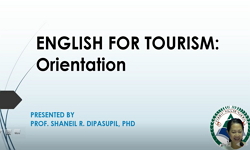The present study aims to investigate the ESP instruction based on digital literacy for tourism English learners. In this study, digital literacy is defined as the ability to understand, synthesize, and use multiple forms of information from digital s...
http://chineseinput.net/에서 pinyin(병음)방식으로 중국어를 변환할 수 있습니다.
변환된 중국어를 복사하여 사용하시면 됩니다.
- 中文 을 입력하시려면 zhongwen을 입력하시고 space를누르시면됩니다.
- 北京 을 입력하시려면 beijing을 입력하시고 space를 누르시면 됩니다.
부가정보
다국어 초록 (Multilingual Abstract)
The present study aims to investigate the ESP instruction based on digital literacy for tourism English learners. In this study, digital literacy is defined as the ability to understand, synthesize, and use multiple forms of information from digital sources to create new information for one’s own purposes. To address the deficits of digital literacy of ESP learners, the study is conducted through design-based research, which is considered to be a problem-solving approach in education. Firstly, a total of 92 tourism English learners were asked to complete the Knowledge and Information Processing Competency (KIPC) survey to diagnose their digital literacy levels. Secondly, the study proposed the digital literacy related activities to facilitate the learners collecting, processing and using digital knowledge and information. The instruction was based on a coursebook-driven approach which added digital literacy activities to the traditional ESP instruction. Lastly, the reflective journals of learners were examined through frequent word analysis. In the findings, ESP learners showed competency in collecting rather than utilizing digital knowledge and information, thus the ESP instruction based on digital literacy was designed to facilitate learners to utilize more digital knowledge and information which helped them to develop teamwork, problem- solving and self-assessment.
동일학술지(권/호) 다른 논문
-
한국 대학생들의 비판적인 사고와 영어쓰기 향상을 위한 미디어 리터러시 활용 수업 모형 연구: 현대적 풍자 그로테스크와 메타포를 중심으로
- 영상영어교육학회
- 이광순
- 2024
- KCI등재
-
내러티브 사고 기반 스토리텔링을 활용한 관용적 표현 지도
- 영상영어교육학회
- 노윤아
- 2024
- KCI등재
-
담화 분석을 통한 대화와 언어와의 관계에 대한 재조명: 영화를 활용한 사례 연구
- 영상영어교육학회
- 이연준
- 2024
- KCI등재
-
- 영상영어교육학회
- Luckel-Semoto, Aya
- 2024
- KCI등재





 KCI
KCI 스콜라
스콜라






